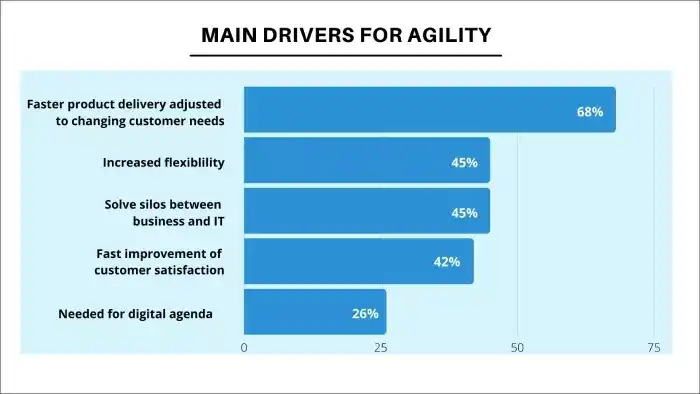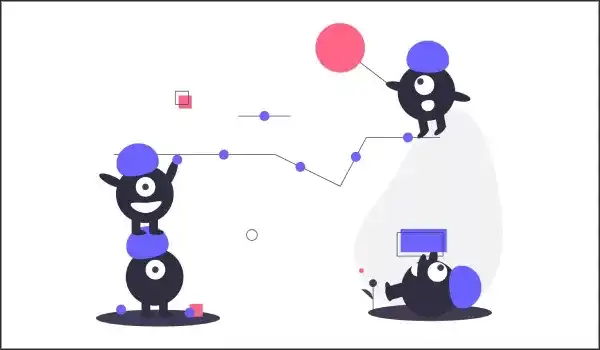To estimate the cost of building a website or an app, use our app cost calculator tool.
Customer needs are changing rapidly, and organizations that want to keep up with the pace of their customers' demands need true agile transformation.
But why agile?
Agile development initiatives have the potential to achieve customer-centricity. Plus, they help produce a high-quality product, reduce time to market, reduce costs, and achieve higher ROI.
With so many perks, it would help to consider hiring agile developers if you want to create a custom digital product.
So, how to hire an agile development team that can turn your idea into a successful reality?
To help you identify the critical skills and qualities to look for in agile developers, we’ve rounded up some exciting insights.
Let’s dive in!
Why Hire an Agile Team for Your Project?
In today’s market, customer experience is everything. Organizations must deliver an exceptional customer experience in order to stay competitive.
A great way to achieve this is to implement agile development effectively. Given this backdrop, it isn’t surprising that the demand for agile developers continues to rise.
Take a moment and think―what comes to your mind when you think of Agile.
- Do you think of developing software?
- Do you think of collaborating with customers?
- What about integrating business and IT?
The good news is that the agile footprint encompasses many facets, including the ones underscored.
Here are some main drivers of agility.

Simply put, Agile methods can help you deliver smartly and get future-ready. Let’s look at some top reasons why you should consider hiring agile teams for your project.
1. Top-notch Quality Product
What are the three most significant things to look out for in your product?
We would say it is quality―quality―and quality. The quality of the app and code is not negotiable. With agile software development, teams typically focus on:
- Striving to deliver fully functioning products
- Focusing on superior quality products, and
- Potentially shippable products with every iteration
The built-in quality practices ensure that all solutions, at each increment, map up to relevant quality standards. However, achieving this isn’t easy. It takes a responsive team to make quality a top priority.
Ideally, responsible agile developers share their goals and principles of built-in quality. Plus, they operate in a swift, flow-based system to rapidly develop and release top-notch business capabilities. An expert team will ensure that you get fast and reliable execution.
2. Improved Customer Satisfaction
When agile developers deliver customer-focused outcomes, it leads to improved customer satisfaction. How is this achieved?
Take a moment to reflect on the traditional framework―the customer is typically involved in the planning phase. The cons to the framework are that the customer is out of the loop, and the go-to-market time significantly increases.
Enter―agile project management practices, which involve the customer in the decision-making process. Now, the customer is always in the loop. So, teams can keep the product backlog updated and prioritized.
Plus, it allows the team to respond to urgent issues efficiently, newly established product requirements, or changes that need addressing. Simply put, it keeps teams more organized, and the go-to-market time is reduced.
It is only natural when development teams make the customer a part of the app curation journey― they’ll want to partner with you. It is almost magic to find synergy with the right agile developer partner.
Customers can safely deliberate ideas, whereas the developer can use their expertise to create game-changing products that exceed expectations.
3. Reduced Risks
The Agile model works in small sprints. It helps incrementally reduce risk with every iteration and release.
So, you don’t have to wait for the end-of-lifecycle testing to correct all risks. You also don’t have to worry about website crashing, payment processing glitches, or poor mobile app ratings. The model helps to mitigate risks as you go.
The quick feedback loops allow teams to reduce product risk and delight the customer with a quality product.
The risk visibility in agile exists throughout the delivery cycle, from inception to customer delivery. Furthermore, the agile developer team can continuously eliminate waste from processes and reduce risk while curating the products.
4. Better Control
In the ever-changing business landscape, management teams struggle to control the quality of software development projects.
However, agile software development processes offer increasing value to organizations. The procedures allow personnel to have better control over the project due to its transparency, quality-control features, and feedback integration.
One can rest assured of the quality throughout the implementation phase of the project.
5. Enhanced Team Morale
How can one develop champion apps?
Think about it―when the development team has increased autonomy and authority over their decisions―it is the foundation for more creative collaboration.
Agile teams are self-organized and self-managed. The group’s cross-functional nature helps the members learn new project management skills and grow in their current roles.
The good part―the team gets together frequently to brainstorm, ideate, and discuss challenges, which helps to collaborate better.
In conclusion, Agile offers the right environment for groups to enjoy flexible team structures. The flexibility, autonomy, collaboration―lead to enhanced team morale, transcending to winning products.
Crucial Skills and Characteristics of An Agile Team that Ensure Successes
Much of the success of agile depends on leadership commitment. Finally, it is the talent that can help agile flourish in the organization.
So, hiring an agile development team that can drive innovation is critical.
What personality traits, skills, and qualities of an agile team help Agile bloom?
We’ve put together some intrinsic characteristics of an agile team. A blend of hard skills and core skills can make a great place to start!

Hard Skills
1. Data Literacy
It is priceless when teams comprehend data and see the value of the collation. In the recent past, the need for data experts who can draw out a greater understanding from the collation has grown.
Furthermore, it helps when experts can translate information into actionable change on agile teams. Organizations need resources who have a background in statistics and data sciences, promoting data-driven decisions.
2. Expertise in Software Tools
It is good that one knows a particular suite of software. However, it is pertinent that developers are experts in operating the software, which optimizes workflow efficiencies.
With a few jobs requiring 90-100 percent of production performed at a computer, software expertise helps.
The effortless functioning of tools can bring efficiency. There are various open-source project management tools, such as OpenProject, TaskJuggler, and more, which can support the entire development process.
3. Know the Agile Manifesto
It is simple―when a team has a deeper understanding of the Agile Manifesto, they have the upper hand while working on various projects.
Plus, it helps to embrace an Agile mindset, and such teams can guide any individual who wants to learn more about the Agile methodology and processes. Knowing about these principles and various Agile frameworks is non-negotiable.
It is great to have team members who know the Agile Manifesto along with the principles of Agile Software.
4. Fluency in Security Policies
Security expertise can help in multiple ways. At first, it can help you combat increasing security threats.
Plus, you can install a multi-layered security scheme to identify and resolve issues at speed. Secondly, agile professionals with an in-depth knowledge of regulations and policies can help with compliance from regulatory watchdogs.
It is a great advantage when professionals guide you through compliance with government policies and more.
5. Development of T-shaped Skills
The learning opportunities are immense for agile teams. It is encouraging to find team members developing T-shaped skills, which are not limited to their predefined roles.
So, keeping the end product in mind, they can foster additional and related skills. The contribution they bring to the development is massive.
At heart, continuous learning is significant for developing T-shaped skills. It creates a framework to collaborate and work with teams, which helps produce phenomenal results.
Core Skills
1. Ownership and Accountability
We all know that employee engagement is that emotional connection where an employee finds purpose and autonomy. It is a sort of mundane world where people come to work and go home, having no idea how and where they contribute.
Agile puts things in a better perspective where people have direct ownership and real-time accountability. Plus, team members have absolute clarity in the big scheme of things. Needless to say, employee engagement is a chart-buster at such workplaces, and people stay more focused on solving problems.
The hamster-like feeling is replaced with a team that’s on a mission. High-performing teams take complete responsibility for failures and stay focused on continuous improvement. That’s a must-have quality!
2. Exceptionally Handling Ambiguity
Here’s another must-have ingredient for a successful agile team. The traits you can add to your checklist of hiring are cultivating agreeableness and learning to stay focused while handling ambiguity.
Management consulting firm McKinsey & Company unveiled guidelines, which highlight some core qualities.
So, you can look for personnel who are resilient to the changes in the industry. With disruptive technologies and a rapidly changing business landscape, agreeableness is a very significant personality trait.
The ability to handle ambiguity with a calm composure is applicable, especially with competition, including bleeding-edge startups and next-generation ideas. The professionals who have these traits easily cope with the industry’s pace, delivering a truly agile way of working.
3. High Level of Emotional Intelligence
Take a moment and think―the global pandemic brought in changes to the industry that were unfathomable. It is easy to find emotions flaring when personnel is unable to handle such situations in a balanced manner.
High-performing teams have an essential building block of emotional intelligence. The quality helps people to be more aware of their emotions at work. It allows groups to be more composed and in control of their feelings.
Emotionally intelligent resources can manage their emotions and that of others as well, brilliantly. The advantage is that they can respect their customers, colleagues, and other stakeholders.
It feels motivating to work with such personnel who can handle situations effectively and seamlessly deliver results.
4. Improved Culture of Excellence
Would you hire a team that settles for ordinary results?
The question is a no-brainer. However, it underscores a significant quality of high-performing agile teams―focusing on excellence. Agile teams concentrate on excellence in processes, engineering, and people.
The excellence attitude is ingrained as a part of their work culture. It is natural to find everyone committed to improving themselves and the team in such an environment.
The team members actively participate in a community of practice, hackathons, self-and team development plans, and other knowledge-sharing opportunities. The initiatives cultivate a culture of excellence and help to achieve unprecedented results.
5. Understanding Psychological Biases
Bias (both conscious and unconscious ones) often lead to gaps in understanding, where personnel could make poor decisions.
So, it helps to combat such scenarios by leveraging metacognition. The good part is that agile encourages frequent communication between developers and customers.
Constant communication helps to understand various perspectives through different lenses. The viewpoints get richer, which helps to develop a product that is bias-free and more useful.
6. Alignment of Performance Objectives with Other Departments
Agile teams that work with a team spirit concentrate on aligning their performance objectives with other groups.
It is natural that one finds team spirit missing when personnel stay more focused on achieving their departmental goals. Team members may face product quality issues and other interdepartmental politics in such scenarios.
Ultimately, it helps bridge any gaps across departments and work towards a common business objective of delivering champion products.
Wrapping Up
Business agility can transform organizations and deliver top-notch results. It takes an arduous effort to lead Agile projects. However, a passion for transforming business through enabling technology can propel it forward.
What can you do?
Seek out agile development teams that suit you and work alongside fierce intellects, such as Imaginovation who love to collaborate. It is the right time to embrace a sustainable Agile mindset and foster an inclusive culture that helps you develop world-class solutions.
Develop World-Class Digital Solutions with Imaginovation
We enjoy transparent and in-depth conversations. However, what we enjoy more is exploring our Agile mindset to draw results for you. If you want to experience the Agile philosophy in practice, talk to us.
We are an award-winning software development company in Raleigh with a cohesive Agile environment supporting organizations with faster and more meaningful software development lifecycles.











